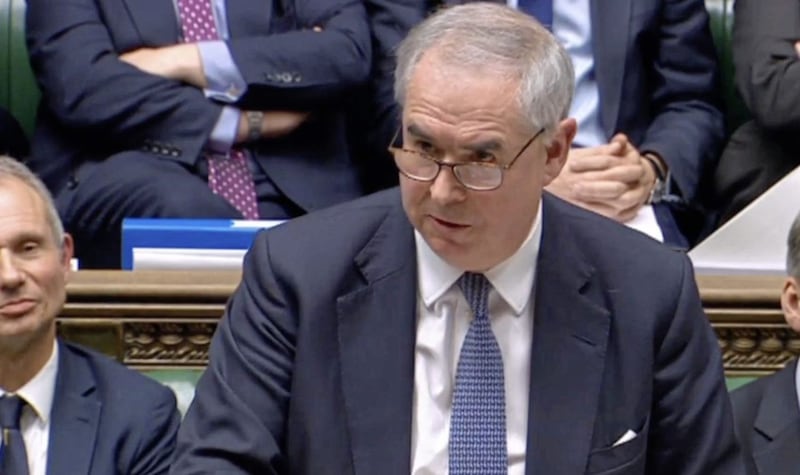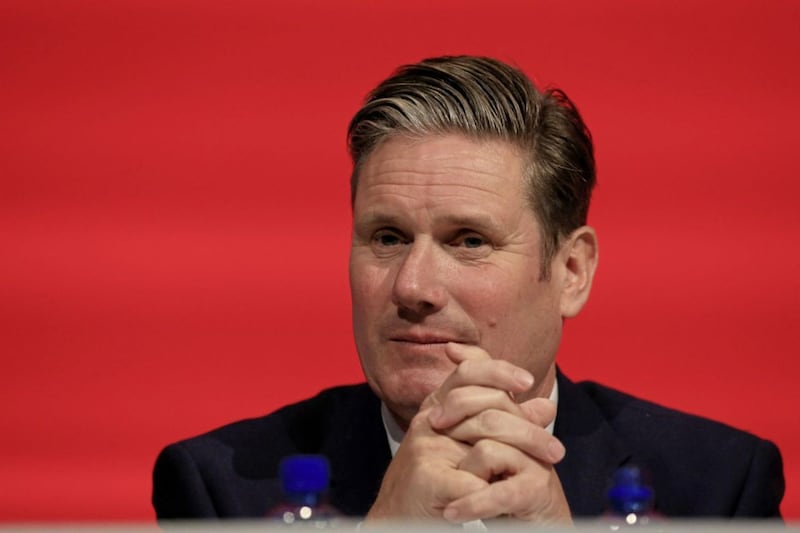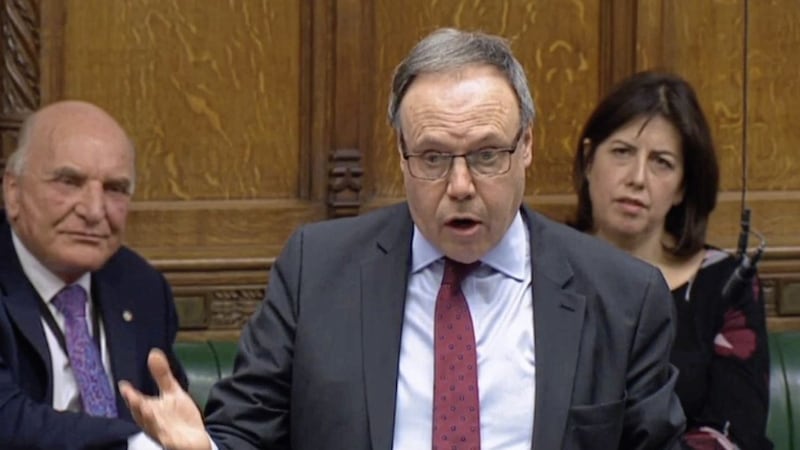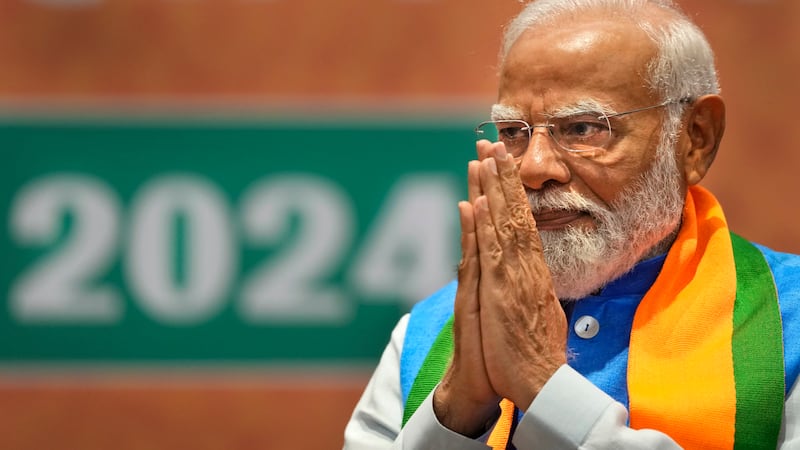LEGAL advice provided to the British cabinet on Theresa May's Brexit deal has warned it could result in the UK becoming stuck for many years in "protracted and repeating rounds of negotiations" with no lawful power to exit.
And it made clear that Brussels could apply to an arbitration panel for Northern Ireland to remain in the EU customs area while the rest of the UK left.
The six-page document by Attorney General Geoffrey Cox was released to MPs a day after the House of Commons found the government in contempt of parliament for trying to keep it secret.
The letter, dated November 13, emerged just minutes before Theresa May faced MPs in a weekly session of Prime Minister's Questions ahead of the second day of a five-day Commons debate on her deal.
DUP MP Nigel Dodds described it as "devastating" and said it made clear that the proposed backstop arrangement for the Irish border was "unacceptable" and must be defeated.
He said: "It is clear from the Attorney General's advice on the legal effect of the protocol on Northern Ireland to the Prime Minister and her cabinet colleagues that we were right to advocate its full publication and we have been vindicated in our opposition to the backstop arrangements contained within the Withdrawal Agreement.
"This advice concisely sets out the stark reality of the operation of the backstop. Its publication demonstrates how the Prime Minister has failed to abide by the commitments she gave in that the United Kingdom as a whole would leave the European Union and that she would ensure there would be no customs or regulatory divergence within the United Kingdom.

"This backstop is totally unacceptable to unionists throughout the United Kingdom and it must be defeated and arrangements renegotiated that uphold the commitments which the Prime Minister and her government has made in the House of Commons."
The Scottish National Party's leader in Westminster, Ian Blackford, called on Mrs May to take responsibility for "concealing the facts on her Brexit deal" from MPs and the public.
But Mrs May rejected the claim, insisting the document contained the same information as a shortened statement made to MPs by Mr Cox earlier this week.
Read more:
- Theresa May pleads for Brexit deal support amid constitutional row
- What does the Brexit withdrawal agreement say about the Irish border?
- Brexit timeline of key events
Shadow Brexit secretary Sir Keir Starmer said that the 33-paragraph document revealed "the central weaknesses in the government's deal".
It is likely to be seized upon by Tory critics of Mrs May's deal, who argue that the backstop arrangement to keep the Irish border open will deny the UK the power to withdraw from a customs union without agreement from Brussels.
Mr Cox found that the protocol setting out the terms of the backstop "does not provide for a mechanism that is likely to enable the UK lawfully to exit the UK-wide customs union without a subsequent agreement".
"This remains the case even if parties are still negotiating many years later and even if the parties believe that talks have clearly broken down and there is no prospect of a future relationship agreement," he added.
Under the arrangements, "for regulatory purposes, GB is essentially treated as a third country by NI for goods passing from GB into NI", he said.
And he said that - despite assurances from both London and Brussels that it is intended to be temporary - the protocol would "endure indefinitely" under international law until another agreement takes its place.
The UK would have no legal means of compelling the EU to conclude any such agreement.
The Attorney General warned: "In the absence of a right of termination, there is a legal risk that the United Kingdom might become subject to protracted and repeating rounds of negotiations.
"This risk must be weighed against the political and economic imperative on both sides to reach an agreement that constitutes a politically stable and permanent basis for their future relationship.
"This is a political decision for the government."
Mr Cox's advice stated that, if Brussels felt that negotiations on a trade deal had broken down or were taking too long, it would be able to apply to the arbitration panel for Britain to be removed from the customs union while Northern Ireland remains - effectively creating the border in the Irish Sea, which Mrs May has said no prime minister could accept.
But the Attorney General said it was "extremely difficult to see" the five-member panel being prepared to make such a political decision unless both sides agreed on it.
He also noted that the backstop arrangement would be "enormously complex" for the EU, requiring "considerable resources", meaning Brussels would come under pressure - especially from Dublin - to bring it to an end.
"Given the lack of any effective means of termination, it is to these very real - albeit unquantifiable - factors, among others, that the UK may have to trust in seeking a satisfactory outcome," he said.
Sir Keir said: "Having reviewed the Attorney General's legal advice, it's obvious why this needed to be placed in the public domain.

"All week we have heard from government ministers that releasing this information could harm the national interest. Nothing of the sort.
"All this advice reveals is the central weaknesses in the government's deal.
"It is unthinkable that the government tried to keep this information from parliament - and indeed the public - before next week's vote."
Green MP Caroline Lucas questioned Mr Cox's claim earlier this week that the advice should not be published "in the national interest".
"On Monday the Attorney General told MPs that it would be 'contrary to the national interest' to release his legal advice of November 13," said Ms Lucas.
"That legal advice consists of just 33 paragraphs. Perhaps the Prime Minister can tell us which paragraphs breach the national interest?"
Ms Lucas said it was "weird" that the cabinet was not provided with formal legal advice on the backstop until the very day that the Commons voted for it to be released.
To the surprise of some MPs, Labour leader Jeremy Corbyn chose not to use any of his six PMQs questions to put Mrs May on the spot over her three defeats over Brexit in the Commons on Tuesday.
Mr Cox said the decision to make his legal advice available to MPs by placing it in parliamentary libraries was "exceptional" and did not set a precedent for any future release of law officers' advice.
He said the use of the arcane parliamentary procedure of a humble address to the Queen to force the release of the document created "constitutional tensions" which "are not themselves conducive to the proper conduct of public affairs".
:::::::::
KEY POINTS OF LEGAL ADVICE
Attorney General Geoffrey Cox's legal "note" to the Prime Minister on the Northern Ireland backstop runs to 33 paragraphs on six pages.
This makes it considerably shorter than the 43-page position paper released by the Government on Monday which sparked Tuesday's contempt vote, which embarrassed the government.
Here are some of the key passages from Tuesday's "full and final" opinion, which related to the conditions and legal context of the Northern Ireland backstop protocol, which would come into effect if the UK failed to agree a withdrawal agreement with the European Union.
Paragraph 8:
"The implication of NI remaining in the EU Single Market for goods, while GB is not, is that for regulatory purposes GB is essentially treated as a third country by NI for goods passing from GB into NI.
"This means regulatory checks would have to take place between NI and GB, normally at airports or ports, although the EU now accepts that many of these could be conducted away from the border.
Paragraph 16:
"It is difficult to conclude otherwise than that the protocol is intended to subsist even when negotiations have clearly broken down.
"The ordinary meaning of the provisions set out above and considered in their context allows no obvious room for the termination of the protocol, save by the achievement of an agreement fulfilling the same objectives.
"Therefore, despite statements in the protocol that it is not intended to be permanent, and the clear intention of the parties that it should be replaced by alternative, permanent arrangements, in international law the protocol would endure indefinitely until a superseding agreement took its place, in whole or in part, as set out therein.
"Further, the Withdrawal Agreement cannot provide a legal means of compelling the EU to conclude such an agreement."
Paragraph 26:
"Article 19 does not expressly state that the review mechanism is intended to be arbitrable under the governance provisions of the Withdrawal Agreement, but I consider that the better view is that it is. Either party could invoke this review mechanism.
"Therefore Article 19 provides also for the EU to argue that the protocol is no longer necessary 'in whole or in part': it would be open to the EU, under the pressure of the factors set out above, if it considered negotiations had clearly broken down, or were taking an unsatisfactorily long time, to argue that Article 50 TEU (Treaty on the European Union) no longer provided a legal base for a UK-wide customs union.
"They could, therefore, submit a formal notification to the Joint Committee arguing that the protocol was no longer necessary in part and that the GB elements of the customs union should fall away, leaving only NI in the EU customs territory as the minimum necessary to achieve the objectives in Article 1.3.
"That contention would meet the strong objection that it would contradict the very clear intention of the parties that the single customs territory created by Article 6.1 was not to be treated as severable."
Paragraph 27:
"In any event, whichever party attempted to submit a notification, it is extremely difficult to see how a five-member arbitral panel made up of lawyers who were independent of the parties would be prepared to make a judgment as political as whether the protocol is no longer necessary, in the absence of the consent of the parties, much less make a finding that would be appropriate that only certain parts of the protocol were no longer necessary."
Paragraph 30:
"In conclusion, the current drafting of the protocol, including Article 19, does not provide for a mechanism that is likely to enable the UK lawfully to exit the UK-wide customs union without a subsequent agreement.
"This remains the case even if the parties are still negotiating many years later, and even if the parties believe that talks have clearly broken down and there is no prospect of a future relationship agreement. The resolution of such a stalemate would have to be political."
Paragraph 33:
"Finally, in considering any international agreement, it is important to also take into account the changing political context in which it is to operate and that the solution to any essentially political question is rarely wholly or even predominantly legal.
"In the absence of a right of termination, there is a legal risk that the United Kingdom might become subject to protracted and repeating rounds of negotiations.
"This risk must be weighed against the political and economic imperative on both sides to reach an agreement that constitutes a politically stable and permanent basis for their future relationship.
"This is a political decision for the Government."








